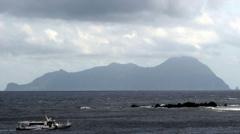For centuries, residents near Lake Suwa in Japan have celebrated the annual formation of Miwatari, a unique ice ridge that symbolized the blessing of a Shinto god. As the phenomenon dwindles, locals express concern over the implications for their spiritual and environmental traditions.
Japan's Lake Suwa: The Spiritual Significance of an Ice Phenomenon

Japan's Lake Suwa: The Spiritual Significance of an Ice Phenomenon
In central Japan, the disappearance of a sacred ice formation known as Miwatari raises concerns about nature's balance and spiritual omens.
In the mountains of central Japan, a long-standing winter tradition is at risk as the Miwatari, a once-majestic ice formation on Lake Suwa, has become less frequent in recent years. For at least six centuries, villagers have awaited the arrival of this natural phenomenon, believed to be the result of a sacred visitation from a wandering Shinto deity. The Miwatari, characterized by a ridge of jagged ice appearing after prolonged cold, has historically evoked a sense of both awe and comfort among local residents.
Shinto priest Kiyoshi Miyasaka is among those who have closely observed the lake and its seasonal transformations throughout the years. With each arrival of the Miwatari comes a deep connection to their spiritual heritage, offering the community a moment to engage in traditional ceremonies that celebrate nature and its divine connections. The distinct noise that precedes the formation often stirs residents from their sleep, culminating in dawn's unveiling of the ice structure, which snakes across the lake's expanse like a mythical creature.
However, the recent absence of the Miwatari has ignited fears among the community. Traditionally, when the ice fails to manifest, it is perceived as an unsettling omen indicating a disruption in the harmony between humanity and the environment. Such events have been meticulously documented by locals, creating an extensive historical archive from as far back as 1443. These records not only reflect climate patterns but also the intertwined fate of the lake with significant local and national events.
As the Miwatari fades into memory, especially evident during recent winter seasons, the community is confronted with a growing worry that nature's equilibrium is now at stake. The lake and its storied past serve as a vivid reminder of humanity's relationship with the natural world, echoing a pressing need for reflection on environmental changes that echo through both spiritual and scientific realms.




















